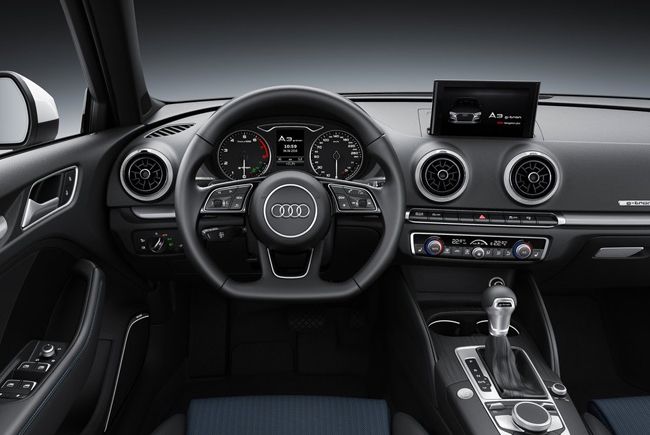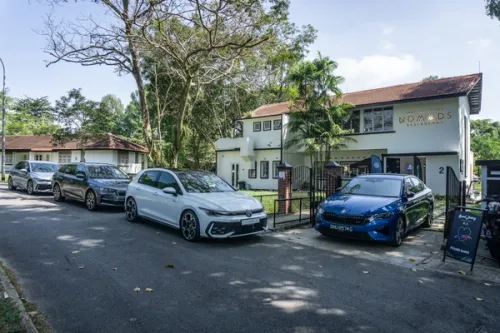1st Place Finish For Audi A3 Sportback G-Tron In Auto Bild Endurance Test
The Audi A3 Sportback g-tron (CNG consumption in kg/100 km: 3.6 – 3.3*; combined fuel consumption in l/100 km: 5.5 – 5.1* (42.8 – 46.1 US mpg); combined CO2 emissions in g/km (CNG): 98 – 89* (157.7 – 143.2 g/mi); combined CO2 emissions in g/km (gasoline): 128 – 117* (206.0 – 188.3 g/mi)) with compressed natural gas (CNG) drive was awarded the first-ever rating of 1+ by the automotive publication Auto Bild after completing 100,000 kilometres of endurance testing. This ranking also impressively confirms the quality of the climate-friendly g-tron technology, which Audi introduced in 2013. The Audi A4 Avant (CNG consumption in kg/100 km: 4.4 – 3.8*; combined fuel consumption in l/100 km: 6.5 – 5.5* (36.2 – 42.8 US mpg); combined CO2 emissions in g/km (CNG): 117 – 102* (188.3 – 164.2 g/mi); combined CO2 emissions in g/km: 147 – 126* (236.6 – 202.8 g/mi)) and the Audi A5 Sportback (CNG consumption in kg/100 km: 4.3 – 3.8*; combined fuel consumption in l/100 km: 6.4 – 5.6* (36.8 – 42.0 US mpg); combined CO2 emissions in g/km (CNG): 115 – 102* (185.1 – 164.2 g/mi); combined CO2 emissions in g/km (gasoline): 144 – 126* (231.7 – 202.8 g/mi)) models with this drive type will be launched in early summer of 2017.


The top ranking of the Audi A3 Sportback g-tron (CNG consumption in kg/100 km: 3.6 – 3.3*; combined fuel consumption in l/100 km: 5.5 – 5.1* (42.8 – 46.1 US mpg); combined CO2 emissions in g/km (CNG): 98 – 89* (157.7 – 143.2 g/mi); combined CO2 emissions in g/km (gasoline): 128 – 117* (206.0 – 188.3 g/mi) ) in the endurance test conducted by automotive publication Auto Bild resulted from the editors’ day-to-day experience with the model and their measurement values, the reliability of the test car, and not least, the final inspection that included disassembly of the car and intensive evaluations of all parts and components by technical experts. In the end, the premium compact model and its CNG drive came out on top in the endurance test ranking, which Auto Bild editors have been conducting for many years. Since 1986, the year the magazine was founded, a total of 246 automobiles from various automakers have been subjected to the test, which usually covers 100,000 kilometers (62,137.1 mi).
“The result of this endurance test not only shows that we build advanced, reliable cars – it also substantiates the quality of the innovative Audi g-tron drive and all of its components,” said Werner Zimmermann, Head of Quality Assurance at AUDI AG, about the outstanding performance.
The Audi A3 Sportback g-tron (CNG consumption in kg/100 km: 3.6 – 3.3*; combined fuel consumption in l/100 km: 5.5 – 5.1* (42.8 – 46.1 US mpg); combined CO2 emissions in g/km (CNG): 98 – 89* (157.7 – 143.2 g/mi); combined CO2 emissions in g/km (gasoline): 128 – 117* (206.0 – 188.3 g/mi)), which made its market debut in April 2014, is powered by a bivalent 1.4 TFSI engine. It delivers 81 kW (110 hp) of power and can run on gasoline, fossil natural gas (CNG) and renewable Audi e-gas. To enable the four-cylinder engine to run on these fuels, Audi engineers modified its cylinder head, turbocharging, fuel injection system and catalytic converter.
Under the five-door model’s luggage compartment floor are two additional tanks that each store around seven kilograms of gas at a pressure of 200 bar. They reduce luggage space only marginally and are constructed from a composite material, making them very lightweight.
With Audi e-gas, the A3 Sportback g-tron (CNG consumption in kg/100 km: 3.6 – 3.3*; combined fuel consumption in l/100 km: 5.5 – 5.1* (42.8 – 46.1 US mpg); combined CO2 emissions in g/km (CNG): 98 – 89* (157.7 – 143.2 g/mi); combined CO2 emissions in g/km (gasoline): 128 – 117* (206.0 – 188.3 g/mi)) is very climate-friendly on the road. The synthetic fuel is produced using renewable energy from water and CO2 or from organic residual materials like straw and plant clippings. During its production, Audi e-gas binds exactly the amount of CO2 emitted by the car. Audi and its partners are producing e-gas with several processes and facilities in Germany as well as in a number of other European countries. The brand is therefore playing a key role as a driving force behind the energy transition in mobility.

Audi is providing customers who order their A3 Sportback g-tron (CNG consumption in kg/100 km: 3.6 – 3.3*; combined fuel consumption in l/100 km: 5.5 – 5.1* (42.8 – 46.1 US mpg); combined CO2 emissions in g/km (CNG): 98 – 89*** (157.7 – 143.2 g/mi); combined CO2 emissions in g/km (gasoline): 128 – 117* (206.0 – 188.3 g/mi)) by May 31, 2018, with access to their supply of this fuel for three years as part of the standard package – and these customers will pay only the regular price for CNG at the fuelling station. By feeding the calculated volume of Audi e-gas into the natural gas grid, Audi is working to ensure a corresponding reduction of CO2 emissions. The German testing and inspection organization TÜV Süd is certifying this balancing method.
The e-gas offer also applies to the Audi A4 Avant g-tron (CNG consumption in kg/100 km: 4.4 – 3.8*; combined fuel consumption in l/100 km: 6.5 – 5.5* (36.2 – 42.8 US mpg); combined CO2 emissions in g/km (CNG): 117 – 102* (188.3 – 164.2 g/mi); combined CO2 emissions in g/km: 147 – 126* (236.6 – 202.8 g/mi)) and Audi A5 Sportback g-tron (CNG consumption in kg/100 km: 4.3 – 3.8*; combined fuel consumption in l/100 km: 6.4 – 5.6* (36.8 – 42.0 US mpg); combined CO2 emissions in g/km (CNG): 115 – 102* (185.1 – 164.2 g/mi); combined CO2 emissions in g/km (gasoline): 144 – 126* (231.7 – 202.8 g/mi)) models, additions to the g-tron fleet that can be ordered beginning in early summer of 2017. Compared to a gasoline-powered car in the same performance class, the Audi g-tron models produce 80 percent less CO2 emissions**.
Credits:


Get the Best Price for your used car
from 500+ dealers in 24 hours

- Convenient and Hassle-Free
- Consumer Protection
Transparent Process
With No Obligation








